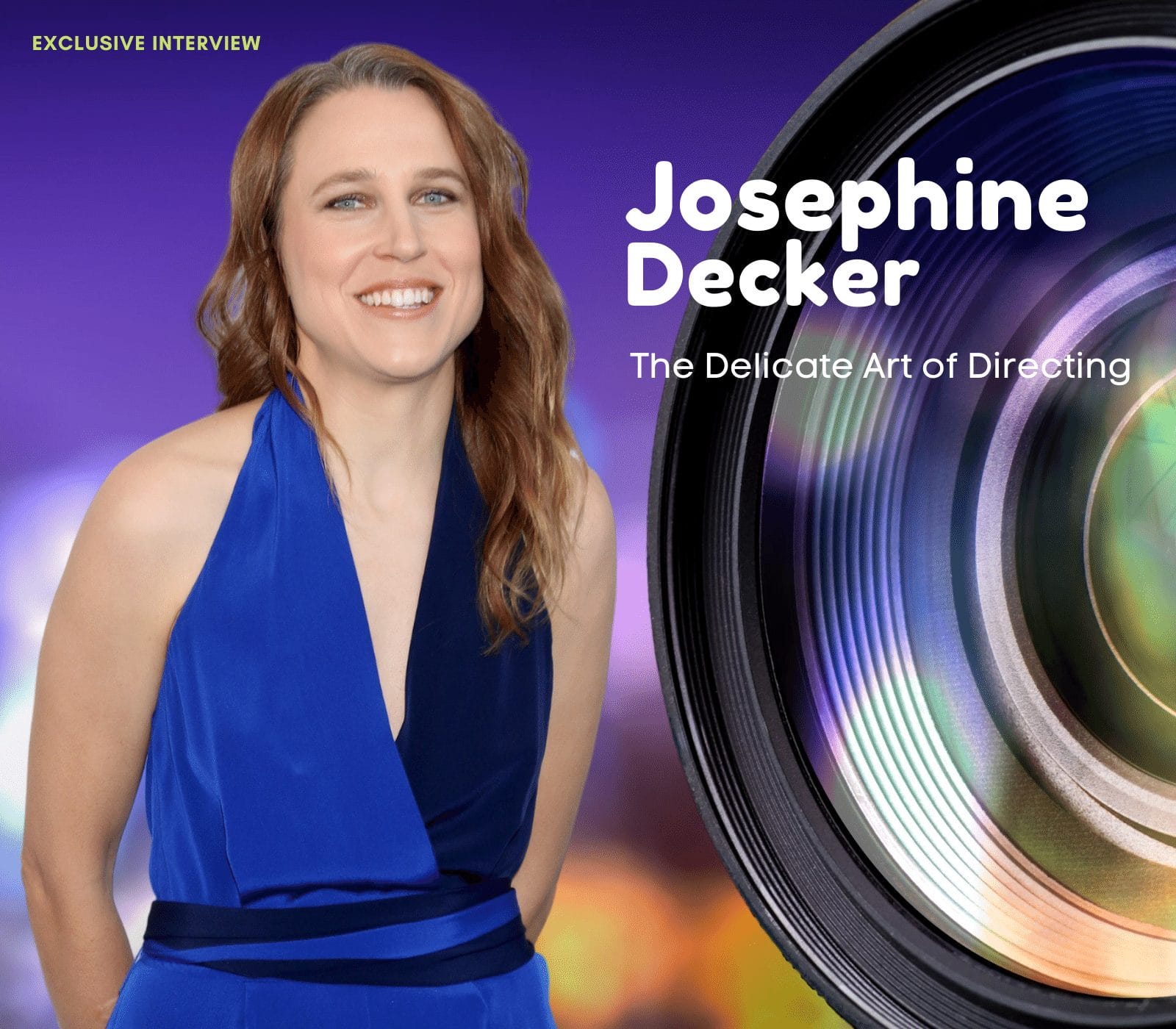Josephine Decker: The Delicate Art of Directing

Josephine Decker: You have to pick great actors. You can’t do too much when you don’t have a great actor. In this movie, we got incredibly lucky. We just had the best actors ever. I cannot believe we got Elizabeth Moss to play Shirley and Odessa Young to be Rose, and she did such a great job of making Rose so complicated. Then Michael Stuhlbarg is one of the greatest actors. He is just one of the greatest actors of all time. He is so wildly good. Then, Logan Lerman playing Fred. He is also just a super patient and an open person. I feel like across the board, we had just terrific actors. Yes, you try to find the person who fits the role and who instinctually feels right for the part. If it’s a fit, they’re usually excited, too, and they bring all their magic.
Liane Buck: “Shirley” is a movie with a lot of soft details that give glimpses into the haunted mind of Shirley Jackson. These subtleties play well to a more artistic inclined public. They are very delicate threads that make the spectator oscillate between madness and seduction. Was that done on purpose, following a framework, or it was just something that started flowing naturally, as the result of a spontaneous creative process?
Josephine Decker: Yes, I know what you mean. We did both. We were trying to be very in the moment and responding to the performers and to the environment. We obviously had our intentions, and then we tried to bring those to life but also tried to go with what wanted to unfold. So, there was a lot of spontaneity and presence, but it was also about trying to make sure that we had fulfilled our dreams for the scene. That we felt that we had, hopefully, exceeded our own expectations. I think it gets back to that unpredictable element that we were talking about earlier. Sometimes in editing, we have to be very, very intentional about how we lay things out so that the audience does feel there’s the symphony of details that is ramping up and building so that certain notes are ringing again and again; so that the ending really feels like the climax to the film as a whole.
Liane Buck: That is remarkably interesting because the movie has a rhythm of its own. I do not know if it’s because I really was into the movie. It’s kind of creepy, and I’m not really a horror type of person, but I noticed that there is actually a little coordination between the playing of the music in the background and the lighting, and how the angles of the characters move into and between the scenes. You may say that this was completely natural, but it looks like it was almost like a symphony. I really liked the movie.
Josephine Decker: That’s so great. I think that is a beautiful metaphor that you brought up – the song. I feel that music is a big inspiration for me for filmmaking.
Liane Buck: Shirley, as a character, is sometimes witchy, sometimes mystical, but always totally eerie. As a creator of this non-biopic tale, would you say that your version of Shirley has real prophetic qualities, or is everything part of her “mise en scene” as a horror writer??
Josephine Decker: Oh. I think a lot of connecting with the beyond or with spirit is about your intention, and I think in the movie, she is trying to be really tapped into her own subconscious and listening to herself. I think the reason that the I ‘Ching or Tarot Cards are so effective is that they ask you a very open-ended question that then you get to put to yourself. So, I think Shirley is opening up. She’s working very hard to work her magic, mostly on herself. She’s trying to open up a part of herself so that her story can come out. So, I think the magic that Shirley is really doing in the film is really the magic of the creative process. It’s the magic of unleashing her own imagination and of using the tools around her to make that happen. Using, or maybe abusing, the tools around her to make that happen. Yes, so I think she’s witchy in the way that artists are witchy. Artists are very much the Shamans of our time.
Liane Buck: Oh, I agree with you, 100%. Now tell us a little bit more personal about yourself. You have been on the circuit of Independent movies and the Production of Documentaries for a while. You are also an actress: How these experiences played a role in the making of Shirley, from production design to the directing?
Josephine Decker: I think that everything you ever do in your life prepares you for directing. The beautiful thing about directing is you have to do everything: Communicating across all the departments, which are the camera, the costumes, the actors – very importantly – hair and makeup, the production design, the coloring at the end of the film, the sound, the editing, the music. There are so many aspects so, I think almost anything in life is preparing you for one of those things. Maybe just living a very crazy story helps you become a better storyteller. So, for me, acting for sure supported me in understanding how to be just really honest with actors about what I know and what I don’t know, or what I see and feel more comfortable in talking to actors. Having been an actor, not very much, but just sometimes, feeling like it opened me up to be a bit freer. There are lots of ways of communicating. There is not a right way to direct an actor. It is more about like you just have to make sure you’re communicating with them, and then to help them feel safe. When I was in High School, I loved photography, I played music really seriously when I was a kid. I think that has had a significant impact on me, too, in terms of how I direct.
Liane Buck: That’s fantastic. Well, you mentioned two things. You mentioned Tarot Cards. You mentioned I ‘Ching. Do you use one of those yourself?
Josephine Decker: I use Tarot Cards sometimes. Yes, me and my best friend, Ruby, we love to read them for each other, even at long distances.
Liane Buck: Another thing I was meaning to ask you is: Do you have a ritual, self-centering, that helps you with your daily work and help you create?
Josephine Decker: I started meditating. I started practicing Zen Buddhism in 2011, so I think that really affected my work so much. When I started practicing Zen Buddhism, I started practicing meditation, so I try to have meditation be a part of my life. I have a baby now. She is eight months old, so I don’t have as much time exactly. I think that is its own meditation. So, she, in a way, now, is my spiritual practice. I grew up Christian, and I still go to church sometimes, and I also practice Zen Buddhism.
Liane Buck: Oh, that’s awesome. I don’t think that Buddhism is actually a religion. I believe that is where I started. I am that weirdo that believed that all paths go to the same place. Do you cultivate any spiritual practice, an if so, what is its impact on your creative process of work?
Josephine Decker: No. Well, I like to make up rituals with my friends. I help run an Artists’ Residency, sometimes, called The School of Making Thinking, and we do a lot of rituals there. I think ritual is beautiful and a super-important part of life and I wish that I did more of it, but I love the rituals that I have been part of. Some of those are ancient ones, and some of them are ones that we just make up for each other at this Artists’ Residency, which is nice.
Liane Buck: There is an element in rituals that’s marks rites of passage. I see things from this perspective, it’s almost like a Shamanic thing –an Aboriginal element. You sing to existence each day of what is in your head. You sing into existence because you have to bring it in. First, it forms in your mind, and you know you as a Shamanic storytelling master, the way you will tell that story that you brought into existence. That’s a ritual. In this movie, you have a lot of rites of passage. I want a lot of people to see the film, but that’s the thing. I think it’s fantastic. Do you have any spiritual vision for the world today? What would you change if you could?
Josephine Decker: Vision for the world. What a beautiful question. I feel fortunate that I get to have the freedom to have a spiritual life that I have the time to. I wish that we had a country that has more equality – income equality – and less income discrimination and racial discrimination. With equal opportunities that more people in America get the chance to really thrive and that all of us can come into the present. You know I had a great meditation teacher who said: “Love is really seeing someone clearly,” and I wish we could really see each other very clearly right now. We don’t really see each other very clearly, and if we could just see each other clearly, there would be a lot more love going on.
Connect with Josephine Decker at http://josephinedecker.squarespace.com/

Creatrix from Sirius. Fairly Odd Mother of Saints (Bernards). Fish Tank aficionado by day ninja by night. Liane is also the Editor-in-Chief of OMTimes Magazine, Co-Founder of Humanity Healing International and Humanity Healing Network, and a Board Member of Saint Lazarus Relief Fund.






